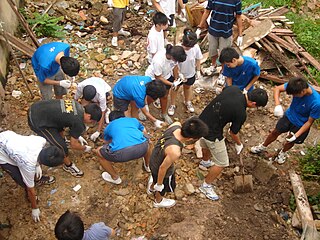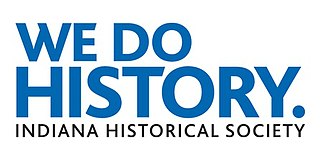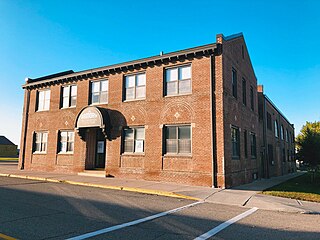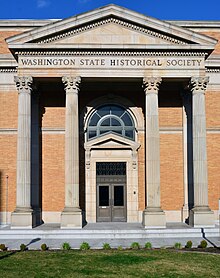
A museum is an institution dedicated to displaying and/or preserving culturally significant objects. Many museums have exhibitions of these objects on public display, and some have private collections that are used by researchers and specialists. Compared to a library, a museum hosts a much wider range of objects and usually focus around a specific theme such as the arts, science, natural history, local history, and other topics. Public museums that host exhibitions and interactive demonstrations are often considered to be tourist attractions, and many museums attract large numbers of visitors from outside their host country, with the most visited museums in the world regularly attracting millions of visitors annually.

A public library is a library, most often a lending library, that is accessible by the general public and is usually funded from public sources, such as taxes. It is operated by librarians and library paraprofessionals, who are also civil servants.

An archive is an accumulation of historical records or materials – in any medium – or the physical facility in which they are located.

Service-learning is an educational approach that combines learning objectives with community service in order to provide a pragmatic, progressive learning experience while meeting societal needs.

Community service is unpaid work performed by a person or group of people for the benefit and betterment of their community without any form of compensation. It can be distinct from volunteering, since it is not always performed on a voluntary basis and may be compulsory. While individual benefits may be realized, they may be performed for a variety of reasons, including citizenship requirements, alternatives to criminal justice sanctions, school or class requirements, and requisites to obtain certain benefits.

The Minnesota Historical Society (MNHS) is a nonprofit educational and cultural institution dedicated to preserving the history of the U.S. state of Minnesota. It was founded by the territorial legislature in 1849, almost a decade before statehood. The Society is named in the Minnesota Constitution. It is headquartered in the Minnesota History Center in downtown Saint Paul.
Public participation, also known as citizen participation or patient and public involvement, is the inclusion of the public in the activities of any organization or project. Public participation is similar to but more inclusive than stakeholder engagement.

Doris M. Johnson High School was a public high school located in the northeast area known as Clifton Park of Baltimore, Maryland.

The European University Institute (EUI) is an international postgraduate and post-doctoral research-intensive university and an intergovernmental organisation with juridical personality, established by its founding member states to contribute to cultural and scientific development in the social sciences, in a European perspective. Its main campus is located in the hills above Florence in Fiesole, Italy.

The Georgia Historical Society (GHS) is a statewide historical society in Georgia. Headquartered in Savannah, Georgia, GHS is one of the oldest historical organizations in the United States. Since 1839, the society has collected, examined, and taught Georgia history through a variety of educational outreach programs, publications, and research services.

The Institute of Museum and Library Services (IMLS) is an independent agency of the United States federal government established in 1996. It is the main source of federal support for libraries and museums within the United States, having the mission to advance, support, and empower America’s museums, libraries, and related organizations through grantmaking, research, and policy development.” In fiscal year 2023, IMLS had a budget of $313.58 million. As of 2023, IMLS currently has 70 full-time employees, many of whom still work remotely. In 2022, the employees voted to unionize, joining hundreds of thousands of federal workers who have joined the American Federation of Government Employees (AFGE) to “build power and have a voice at work.”
Arts administration is a field in the arts sector that facilitates programming within cultural organizations. Arts administrators are responsible for facilitating the day-to-day operations of the organization as well as the long term goals by and fulfilling its vision, mission and mandate. Arts management became present in the arts and culture sector in the 1960s. Organizations include professional non-profit entities. For examples theaters, museums, symphony orchestras, concert bands, jazz organizations, opera houses, ballet companies and many smaller professional and non-professional for-profit arts-related organizations. The duties of an arts administrator can include staff management, marketing, budget management, public relations, fundraising, program development evaluation, community engagement, strategic planning, and board relations.

The Indiana Historical Society (IHS) is one of the United States' oldest and largest historical societies. It describes itself as "Indiana's Storyteller".

Local history is the study of history in a geographically local context, often concentrating on a relatively small local community. It incorporates cultural and social aspects of history. Local history is not merely national history writ small but a study of past events in a given geographical area which is based on a wide variety of documentary evidence and placed in a comparative context that is both regional and national. Historic plaques are one form of documentation of significant occurrences in the past and oral histories are another.
Civilian oversight, sometimes referred to as civilian review or citizen oversight, is a form of civilian participation in reviewing government activities, most commonly accusations of police misconduct. Members of civilian oversight boards are generally not employed by the government entity which they are reviewing. These groups are tasked with direct involvement in the citizen complaints process and develop solutions to improve government accountability. Responsibilities of civilian oversight groups can vary significantly depending on the jurisdiction and their ability to become influential. Oversight should not simply criticize but should improve government through citizen support for government responsiveness, accountability, transparency, and overall efficiency.

The New Hampshire Historical Society is an independent nonprofit organization that saves, preserves, and shares the history of New Hampshire. The organization is headquartered in Concord, the capital city of New Hampshire.

MorningSide is a neighborhood on the east side of Detroit, Michigan. The area is bounded by Harper Avenue and Interstate 94 on the north, Mack Avenue to the south, East Outer Drive and Whittier on the east and Alter Road and East Outer Drive to the west. The local association that shares the name MorningSide with the community is a collaboration of residents working together to take care of this area.
The American Association for State and Local History (AASLH) is a non-profit association for state and local history, with a primary focus on history professionals, history volunteers, museums, historical societies, and other history-related organizations and public history professionals. Since 1964, it is headquartered in Nashville, TN, and currently has about 3,200 institutional members, 1,300 individual members, and 34 academic program members. The organization has 11 full-time staff members.
The Women’s Project of New Jersey was initiated in October 1984 to publish the first comprehensive reference volume on both representative and notable women in New Jersey’s history. Its mission expanded to promote the understanding of “the role of women in the history and culture of our state." The original goal was achieved in April 1990 with the publication of the award-winning volume Past and Promise: Lives of New Jersey Women. The organization’s broader goal was and continues to be achieved by the creation of a traveling photographic exhibit, a speakers’ panel series, a lecture series, two school workbooks and K-12 curricula found on the NJ women’s history website, a speakers’ bureau, a poster series, a paperback revised and updated edition of Past and Promise, and the development of the nation’s first state-based women’s history website.

The Nobles County Heritage Center, located in Worthington, Minnesota, is a cultural institution owned and operated by the Nobles County Historical Society, dedicated to preserving and sharing the history of Nobles County. Housed within the historic Worthington Armory, the Center serves as a repository for historical artifacts, documents, and archives.

















